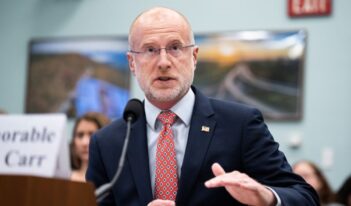
Courts curb NLRB and CFPB power, California justices reject redistricting petition, HHS tightens Medicaid checks, and more…
IN THE NEWS
- The U.S. Court of Appeals for the Fifth Circuit ruled that the National Labor Relations Board (NLRB) is unconstitutionally structured because, by law, its members and administrative law judges can only be removed for cause, rather than at the President’s discretion. The court held that these removal protections violate the separation of powers by limiting presidential control over independent regulatory agencies. As for the NLRB’s presidentially appointed members, the Court reasoned that they “wield substantial executive power” and, as a result, cannot be protected against removal under the Court’s 1935 decision in Humphrey’s Executor v. United States, which upheld removal protections for members of the Federal Trade Commission. The Fifth Circuit relied on the Supreme Court’s recent decision in Trump v. Wilcox, in which the Court said it would “likely” conclude that the NLRB members are freely removable by the President.
- The U.S. Court of Appeals for the D.C. Circuit lifted a lower court order blocking the Consumer Financial Protection Bureau (CFPB) from carrying out layoffs and ceasing activities. In a 2-1 decision, the court held that the lower court lacked jurisdiction to review federal employment claims, and the remaining claims did not challenge a “discrete, final agency action” that courts could review under the Administrative Procedure Act. Last month, President Donald J. Trump’s mega tax and spending law reduced the CFPB’s funding by nearly half.
- The California Supreme Court rejected a petition arguing that the fast-track plan to redraw congressional districts violated the state’s 30-day notice rule, stating that Republican petitioners “failed to meet their burden of establishing a basis for relief” under the California Constitution. Democrats used a procedural maneuver known as “gut and amend” to repurpose an existing bill and fast-track the proposal for the November 4 ballot. The measure, which would temporarily suspend California’s independent redistricting commission, has been framed as a direct response to Republican redistricting efforts in Texas.
- The U.S. Department of Education issued a proposed rule that would prevent benefits under the Public Service Loan Forgiveness program from being provided to student loan borrowers whose employers are engaged in activities with a “substantial illegal purpose.” The program currently allows non-profit and public employees to have their student loans forgiven after 10 years of qualifying payments. The proposed rule outlines several categories of prohibited activities with “substantial illegal purposes” by employers, including gender-affirming care and aiding or abetting violations of immigration laws.
- The U.S. Department of Health and Human Services (HHS) announced an initiative to ensure that Medicaid and Children’s Health Insurance Program enrollees are U.S. citizens or have satisfactory immigration status. Under this initiative, the Centers for Medicare and Medicaid Services will provide states with monthly enrollment reports identifying individuals whose citizenship or immigration status could not be confirmed through federal databases. In a statement, HHS noted that states will be responsible for reviewing cases, verifying the immigration status of flagged individuals, and “taking appropriate actions.”
- After a lawsuit by the District of Columbia, the U.S. Department of Justice agreed to reverse its appointment of a new emergency police commissioner in Washington, D.C., and restored local rules that limit cooperation between D.C. police and federal officials who enforce immigration laws. During an emergency hearing, U.S. District Judge Ana Reyes reportedly reasoned that, although the executive branch may issue requests under the Home Rule Act with which D.C. police must comply, the administration cannot take direct control of the D.C. police department. D.C. Mayor Muriel Bowser stated that she needed to “defend D.C.’s autonomy” in response to the initial orders. The Justice Department’s recission comes amid broader federal efforts to assert control in D.C., such as the deployment of the National Guard.
- Multiple attorneys general sued the U.S. Department of Justice to stop the withholding of federal funds to states that do not comply with federal immigration enforcement efforts. After an executive order empowered the Justice Department to withhold federal funding from “sanctuary jurisdictions”—those “obstructing” federal immigration policy—the department reportedly plans to terminate grants under the Victims of Crime Act, which provides over $1 billion annually to support resources for victims. A district attorney in Oregon, one of the suing states, said that the resultant cuts to victim resources would increase crime overall and that one Oregon sexual assault shelter reportedly shut down in anticipation of the funding cuts.
- The U.S. Department of Health and Human Services terminated federal funding for California’s Personal Responsibility Education Program, a youth sexual health education program, after the state refused to remove “disturbing gender ideology” from the program’s curriculum. The Administration for Children and Families, an agency within HHS, threatened in June to terminate funding, a reported $12.3 billion, if the state failed to modify the program. California Attorney General Rob Bonta, leading several states, sued the Trump Administration in July over its efforts to restrict access to health care for transgender, intersex, and nonbinary youth.
WHAT WE’RE READING THIS WEEK
- In a National Bureau of Economic Research working paper, Erkut Y. Ozbay, a professor of economics at the University of Maryland, and several coauthors examined the effect of organ procurement regulations on organ donations, transplant activity, and system costs. In 2019, the Centers for Medicare and Medicaid Services implemented standardized evaluation metrics and new recertification processes for organ procurement organizations that aimed to increase the national supply of transplantable organs. The Ozbay team found that, after the 2019 reforms, the average monthly number of kidneys recovered by organ procurement organizations increased by almost 30 percent. Ozbay and his coauthors estimated an associated reduction of dialysis costs by $1.96 billion. They cautioned that the current policy guaranteeing full Medicare reimbursement for only kidney procurement could lead to an imbalance in the procurement and transplant of other organ types.
- In an article in the Yale Journal on Regulation, David Chen, an adjunct professor of clinical law at the New York University School of Law, challenged the prevailing assumption that the federal government has exclusive control over immigration status determinations. He argued that, beyond enforcement and state benefits, states are increasingly shaping who receives immigration status through their influence on adjudication processes. He contended that courts are not equipped to address such disputes because courts rely on outdated presumptions of federalism and urged greater consideration of administrative law principles to account for states’ roles as joint policymakers in immigration selection.
- A new U.S. Government Accountability Office (GAO) report examined the effectiveness of the U.S. Environmental Protection Agency (EPA), Federal Emergency Management Agency (FEMA), and the U.S. Department of Agriculture (USDA) at providing economically disadvantaged communities with financial assistance to improve water treatment infrastructure. The report evaluated each agency’s efforts. It found, for example, that EPA provided communities with technical assistance to draft more effective grant applications, while FEMA eased cost-sharing requirements and published materials to clarify that other federal funding could be applied to satisfy these requirements. GAO recommended several measures, including that FEMA and USDA use EPA-developed mapping tools to assess which communities will benefit from potential grants and that FEMA improve its tracking of when and why communities withdraw their grant applications to identify further barriers.
EDITOR’S CHOICE
In a 2024 article in The Regulatory Review, Matthew Lee Wiener, a distinguished lecturer at the University of Pennsylvania Carey Law School, argued that SEC v. Jarkesy may be the Supreme Court’s most consequential regulatory decision in decades, even more than the overruling of Chevron. He contended that, by holding that defendants are entitled to a jury trial in federal court when the SEC seeks civil penalties, the Court limited the agency’s in-house adjudicatory authority and narrowed the “public rights” exception that had long supported administrative adjudication. Wiener emphasized that, although the SEC can still pursue penalties in federal court, the reasoning in Jarkesy invites broader challenges to other agency remedies, such as injunctions, reinstatement orders, and license revocations. He warned that because this decision was the first time the Court invalidated a statute granting adjudicatory authority to a federal agency, it represents a historic retrenchment of the administrative state and is likely to prompt further constitutional challenges.



